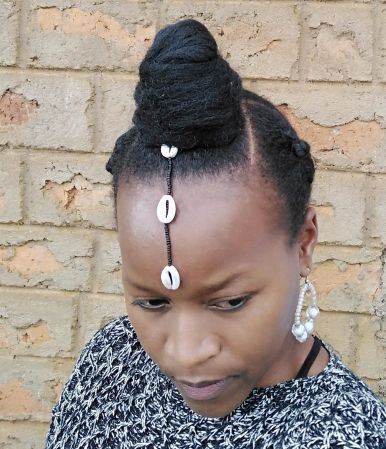The History And Spirituality Behind Cowrie Shells
More Than Just A Fashion Statement—The Deep History And Spirituality Behind Cowrie Shells

WASHINGTON, DC – JANUARY 20: U.S. Associate Supreme Court Justice Ketanji Brown Jackson attends inauguration ceremonies in the Rotunda of the U.S. Capitol on January 20, 2025 in Washington, DC. Donald Trump takes office for his second term as the 47th president of the United States. Source: Chip Somodevilla / Getty
On Martin Luther King Jr. Day, amid the pomp of Donald Trump’s second inauguration, Supreme Court Justice Ketanji Brown Jackson stood out from the crowd. Seated among a sea of white conservatives and billionaires, Jackson’s ceremonial black robes were complemented by a striking cowrie shell collar—a deliberate and powerful choice.
This was not merely a fashion statement. The cowrie shells have been long revered in Black and African cultures, symbolizing community, protection, resistance, and survival—values that stand in stark contrast to the ideologies currently taking center stage in the White House.
For the first Black woman to serve on the nation’s highest court to wear such a collar was an act of quiet defiance. Jackson’s collar spoke of resilience and a deep connection to the cultural legacies that continue to shape the fight for justice.
RELATED CONTENT: Trump Is Back—Here’s What That Means For Your Zodiac Sign (And Your Sanity)

African man wearing hat adorned with cowrie shells. Source: sruilk / Getty
What Is The Spiritual Significance Of Cowrie Shells?
Throughout the African diaspora, these tiny, oval-shaped shells hold both spiritual and cultural significance. They originate at the bottom of the Indian and Pacific oceans, formed on the back of a sea snail. When the snail dies and decomposes, the shell remains, leaving countless of these strong, speckled shells scattered across the ocean floor to make their way to multiple shores daily.
Cowrie shells have had multiple uses throughout history and African diasporic culture. In West Africa, cowrie shells were used in religious rituals where the white shell is associated with purity, health, growth, and insight. Cowrie shells are still used today in Yoruba divination rituals. The shells, called “the mouth of the orisha,” are used by a diviner when communicating with the orishas landing either face up representing a positive answer, or face down representing a negative answer from the deities. In some African traditions, cowrie shells symbolize fertility as their curved shape resembles a pregnant woman’s belly.

Hamer tribe woman, Dimeka, Omo valley, Ethiopia. Source: Eric Lafforgue/Art in All of Us / Getty
Cowrie shells were also an important source of wealth from as early as the 14th century. They’re believed to be the original Pan-African currency originating in West Africa, but being used in trade all over the world throughout Africa, Asia, Europe, and the Americas. Unlike coins or paper money, cowrie shells were durable and visually appealing, with a variety of patterns across the tiny domed shell that made them harder to counterfeit.
Cowries could be frequently found in fashion and traditional clothing, a practice that continues today. Shells have been sewn into traditional African masks and robes, adorning garments with the spiritual symbol. Today, cowrie shells are used to embellish braids, locs, and other natural hairstyles as a nod to our African roots. The shells can also be seen in some fine jewelry brands and most recently in the judicial bib worn by Justice Brown, where dozens of cascading shells were arranged to adorn her robes (with a matching pair of cowrie earrings).

African natural hair bun with cowrie shells. Source: JELWEI ARTS FASHION / Getty
Some historians believe the shell was sewn into clothing and hair of enslaved Black Americans as an amulet for protection from the horrors of slavery and to ward off evil, making Justice Brown’s choice to wear them as Trump enters his second term all the more poignant. Black women are particularly vulnerable under the new administration. These tiny shells are symbols of abundance, safety, power, and connection for Black people at a time when we need these values the most.
RELATED CONTENT: They Tried It! 10 Black Women Who Have Publicly Supported Donald Trump
- From Basic To Bomb: 5 Ways To Elevate Your Sex Game This Summer
- Gym Etiquette 101: 10 Rules Every Respectful Member Should Follow
- 5 Beyoncé Hairstyles To Complete Your ‘Cowboy Carter’ Tour Look
- Here’s The Real Reason Black People Wash Their Chicken Before Cooking
- Protected: The Sound Of Movement: Ledisi Reflects On The Power Of Protest Music And Self-Love In ‘The Crown’
















